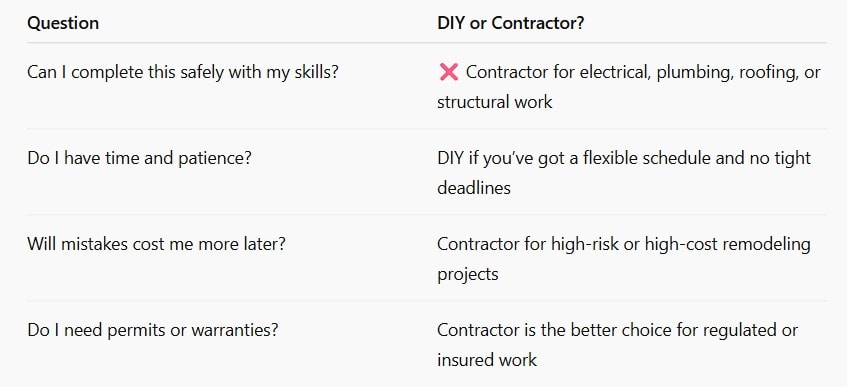When it comes to home improvement, one of the biggest decisions is who’s going to do the work—you or a pro? Maybe you’re thinking about saving some money by handling things yourself. Or maybe the idea of navigating permits, plumbing, or structural repairs has you looking for help.
In this guide, we’ll look at the pros and cons of both routes. If you’re weighing the benefits of hiring a general contractor in Johnstown, PA versus taking the DIY approach, this post will help you make the right call for your time, budget, and goals.
Key Takeaways
- DIY projects can be rewarding, but they’re best limited to low-risk tasks that don’t require permits or specialized skills.
- For complex work involving plumbing, masonry, electrical, or structural changes, a licensed contractor brings the ability, experience, and oversight needed to protect your home.
- Quality, reputation, and attention to detail matter, especially when the job impacts your safety, resale value, or long-term maintenance.
What DIY Can Do (and When It Struggles)
Taking the do-it-yourself route can be a smart move, especially for smaller tasks that don’t require permits, structural changes, or advanced skills. For many Johnstown homeowners, DIY offers a few key benefits: you can save on labor costs, work at your own pace, and get the satisfaction of doing the job yourself.
Projects like interior painting, basic landscaping, shelf installations, or cosmetic updates in a bathroom or kitchen are usually good DIY territory. These types of tasks typically don’t involve electrical work, plumbing, or major demolition.
But DIY has limits. Without the right tools, training, or experience, even simple remodel projects can lead to frustrating mistakes or, worse, injuries. And if you’re dealing with flooring installation, countertop refinishing, or anything tied to plumbing or electrical systems, the risks go up quickly.
In these cases, hiring a professional is about safety and long-term quality.
Where a Contractor Makes the Difference
For larger or more complex jobs, hiring a general contractor brings serious advantages. Their teams are made up of skilled professionals who specialize in everything from bathroom remodeling and basement finishing to roofing and full-scale renovations. Expertise helps avoid costly mistakes and ensures your project meets code requirements.
Contractors also bring efficiency. They coordinate timelines, subcontractors, materials, and permits so the job moves forward without unnecessary delays. A high level of organization is especially important when you're remodeling a space like a kitchen or bathroom, where multiple trades need to work in sync.
And let’s not forget safety and compliance. Tasks involving plumbing, electrical, or structural changes demand licensed pros who understand building codes and know how to pull the correct permits. When done right, the result is reliable, long-lasting craftsmanship, and peace of mind that your home is in good hands.
Cost Comparison: DIY vs. Hiring a General Contractor
At first glance, DIY might seem like the budget-friendly choice. You're not paying for labor, and you can spread costs out over time. But there’s more to it. Materials, tool rentals, and unexpected fixes add up quickly. And one mistake can cost more to correct than hiring a pro from the start.
Hiring a general contractor means paying more upfront, but you're getting a full package: labor, materials, subcontractor management, and permitting, all handled for you. Plus, professional remodeling services often include warranties and protections you won’t get when you go it alone.
If you're remodeling a kitchen, finishing a basement, or tackling anything beyond surface-level updates, it's worth weighing the real costs not just in money, but in time, stress, and long-term reliability.
Key Factors to Consider for Projects
When deciding between DIY and hiring a professional, also think about the fit. Complex jobs like plumbing, roofing, structural changes, or full basement remodeling require licensed expertise to ensure the work is done safely and up to code. In Johnstown, certain projects also require permits that only licensed contractors can pull.
Your time is another major factor. If you’re balancing a full-time job, a DIY remodel can stretch on for weeks or months. Hiring pros means the work gets done faster, with less disruption to your daily life.
There are also long-term considerations. Quality work completed by experienced professionals doesn’t just look better, it can add real value to your home. Especially with major spaces like a kitchen or basement, investing in craftsmanship often pays off in resale.
A Smart Middle Ground: Hybrid Approach
You don’t always have to choose between full DIY or full-service contracting because there’s room in the middle. For some Johnstown homeowners, it makes sense to handle the simpler parts of a project, like painting, light demolition, or basic landscaping, while leaving the structural or code-heavy work to a licensed contractor.
This approach can help keep your budget under control without sacrificing safety or long-term quality. You get to stay involved in your remodel while making sure the critical parts—like countertop installation, electrical, or kitchen remodeling—are done by professionals who know the codes, permits, and materials inside out.
If you're confident with certain tasks and want to stay hands-on, that’s fine. Just be realistic about what you're taking on, and don’t hesitate to bring in the pros when the stakes are higher.
Decision-Making Checklist
Still unsure whether to DIY or hire a contractor? Use this quick list to weigh your options before you start:

Use this checklist to keep expectations clear, protect your investment, and avoid headaches—no matter how hands-on you plan to be.
Let’s Talk About Your Project
Thinking about tackling a renovation or repair but unsure where to start? Whether you're weighing the DIY route or ready to bring in a pro, we can help you make the right call for your home.
At Keystone State Restoration, we handle everything from planning to permits with licensed crews and clear timelines. If you’re not sure what parts of your project need a general contractor or just want a second opinion, reach out to us for a free estimate. Let’s figure it out together.
Conclusion
DIY has its place—especially for cosmetic upgrades or smaller tasks that don’t require permits or specialized skills. But for anything more involved, hiring a licensed professional is the safer, more efficient option.
Before you pick up the tools or start calling contractors, take a moment to weigh your comfort level, your timeline, and what’s at stake. Not every project needs a crew, but the right one can save you time, stress, and money in the long run.
Frequently Asked Questions
Is countertop refinishing a DIY-friendly project?
It depends on the material and your experience level. While some Johnstown homeowners attempt countertop refinishing themselves, it often requires special tools and techniques to get a smooth, lasting finish. For high-traffic areas like kitchens, hiring a professional can lead to better results with fewer concerns about durability or uneven surfaces.
What types of general contracting work are best left to professionals?
General contracting is ideal for projects that involve multiple trades, like electrical, tile work, or structural changes. If your remodel requires permits, inspections, or complex scheduling, working with a licensed contractor ensures efficient progress and clear oversight across all aspects of the job.
Do Johnstown homeowners need permits for DIY projects?
Some projects, like simple painting or minor repairs, don’t require permits. But if you're planning to alter plumbing, electrical, or load-bearing structures, permits are a must. Checking with your local building department ensures your project meets the code and avoids costly issues later.
I recently moved from Northern Colorado—are there major differences in local DIY regulations?
Yes, municipal rules can vary significantly. Northern Colorado may have different permit requirements or inspection standards than Johnstown. Before starting any major project in your new location, it’s a good idea to review local codes or consult a contractor familiar with Johnstown regulations and building practices.


.png)
.png)
.png)
.png)





